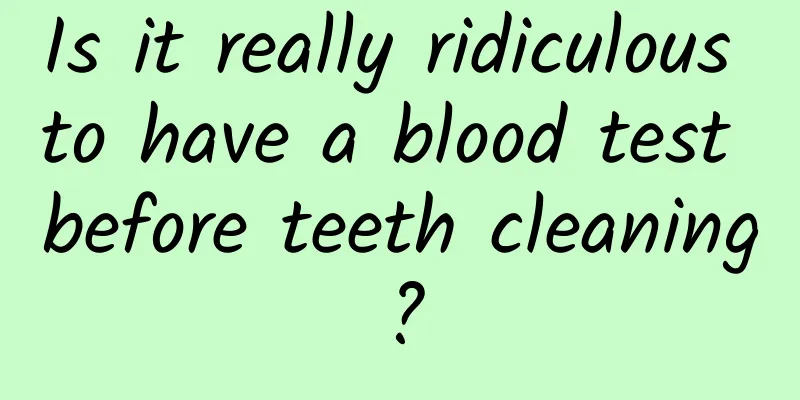Is it really ridiculous to have a blood test before teeth cleaning?

|
This is the 4264th article of Da Yi Xiao Hu A few days ago, there was a hot topic on the Internet, which was whether teeth cleaning could cause syphilis infection, and this led to the topic of whether blood tests were needed before teeth cleaning. This topic was originally raised by a popular science expert, but was soon questioned by some medical professionals; and among the readers, although there were supporters, there were more opponents. Medical professionals and opponents have very good reasons: regular hospitals are able to strictly sterilize instruments and equipment, and adding a blood test is simply unnecessary and will inevitably lead to suspicion of over-medicalization and excessive charges. To clarify this matter, we must clarify the following issues: ① Is there a risk of infection during the teeth cleaning process? ②If there is a risk, what is the key to infection prevention and control? ③Is it necessary to have a blood test? Is there really a risk of infection when having teeth cleaned? In nature, there are many ways for pathogenic microorganisms to spread. However, in the process of oral diagnosis and treatment, the possible ways are basically divided into three categories: contact transmission, droplet transmission and air transmission. Contact transmission refers to the transmission of pathogenic microorganisms to susceptible persons through direct contact with blood containing pathogenic microorganisms or saliva contaminated by blood, or indirect contact with contaminated medical equipment, instruments and daily necessities; The so-called droplet transmission is the transmission of pathogenic microorganisms to susceptible people through droplets (>5 μm) containing pathogenic microorganisms within a close range (within 1 m); Airborne transmission refers to the transmission of pathogenic microorganisms to susceptible people over long distances through droplet nuclei (≤5 μm) containing pathogenic microorganisms. Therefore, as one of the routine oral diagnosis and treatment operations, teeth cleaning not only does have the risk of infection, but also the possible infection pathogens are numerous. What is the key to infection prevention and control during dental cleaning? Although the risk of infection during teeth cleaning does exist, due to the different pathogenicity of different pathogens, the possible transmission routes are also different. Therefore, infection prevention and control should be targeted during the teeth cleaning process. It is generally believed that the key infections that need to be prevented and controlled during oral diagnosis and treatment are infections caused by pathogens such as human immunodeficiency virus (HIV), hepatitis B virus (HBV), Mycobacterium tuberculosis and Treponema pallidum. As we all know, except for Mycobacterium tuberculosis, the other three pathogens are usually transmitted by contact. Therefore, the importance of using disposable instruments or sterilized instruments and equipment is self-evident. Under the premise of using disposable instruments or sterilized instruments and equipment, although the possibility of HIV, HBV and Treponema pallidum being transmitted through contact during tooth washing has been greatly reduced, HIV and HBV may still be transmitted through droplets or air. However, Treponema pallidum is not likely to be transmitted through droplets or air because it is difficult to survive outside the body. It can be seen from this that under the premise of using disposable instruments or sterilized instruments and equipment, although the possibility of syphilis transmission is very small, it is still impossible to completely avoid the transmission of HIV and HBV, especially since the tooth cleaning process is still an invasive operation. So, do you still think that HIV and hepatitis B are overkill as blood tests? At the same time, from another perspective, these diseases are also contraindications for teeth cleaning. Blood tests are not just for infectious diseases Before teeth cleaning, blood tests are done to check for infectious diseases and bleeding diseases. Because teeth cleaning is a treatment for gingivitis and periodontitis, and the gum tissue of patients with gingivitis and periodontitis is already inflamed and easily bleeds. If the patient has a tendency to bleed, rash teeth cleaning may cause an unmanageable situation. As the saying goes, it is better to be safe than sorry. Now you know, right? Although it is unlikely that you will be infected with syphilis during teeth cleaning, the risk of HIV and HBV infection still exists if the patient is not screened, and blood tests are not just for avoiding infection. Therefore, requiring blood tests before teeth cleaning is not an exaggeration, nor is it an item that is charged randomly. Author: Shanghai Health and Health Development Research Center rich |
<<: The pain feels like a tiger bite. Do you understand this kind of shoulder joint pain?
Recommend
Will a man get sick if he holds it in for too long?
If men hold back for too long, they may get sick,...
Is it a boy or a girl if the morning sickness is severe?
Pregnant women may experience morning sickness du...
How to make special maocai?
Maocai is very spicy and delicious. There are seve...
What are the reasons for women's deep neck lines?
Nowadays, women know how to take care of themselv...
The belly is swollen like a pregnant woman
I believe everyone has had bloating in their live...
What are the taboos for women to use moxibustion on Guanyuan?
People should be familiar with the method of moxi...
Why do you have hemorrhoids after giving birth?
In our lives, many women will suffer from hemorrh...
Is acne on the chin related to gynecological disease?
Acne on the chin is a common phenomenon, which is...
What is the best way to cook glutinous rice cake? How to preserve glutinous rice cake?
Ciba is a common food in our lives. The season fo...
A woman's butt hides a shocking secret! Come and see
Women’s buttocks actually have many meanings. Let...
Fully understanding the standardized diagnosis and treatment of infertility can help you avoid detours
This is the 4677th article of Da Yi Xiao Hu Conce...
Can I have a painless abortion in two months?
There are many situations in daily life. Some peo...
Why is sesame paste so high in calories? Will eating too much sesame paste cause internal heat?
In recent issues, I have been sharing some life k...
Pictures of redness and inflammation on the surface of the breast
If the breasts are inflamed, it will affect the h...









